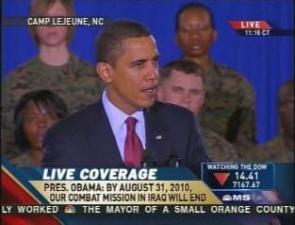The date we can all look forward to: August 31, 2010.
President Barack Obama on Friday declared that the United States would end its bloody and costly combat mission in Iraq by late summer of 2010 — but a dramatic force reduction was not expected until after Iraq's elections at the end of this year.
"Let me say this as plainly as I can: by August 31, 2010, our combat mission in Iraq will end," he said in a speech at the Marine Corps base at Camp Lejeune, N.C. "As we carry out this drawdown, my highest priority will be the safety and security of our troops and civilians in Iraq."
While perhaps not as newsworthy, Obama's remarks at the end of the speech were striking:
Obama: As a nation, we have had our share of debates about the war in Iraq. It has, at times, divided us as a people. To this very day, there are some Americans who want to stay in Iraq longer, and some who want to leave faster. But there should be no disagreement on what the men and women of our military have achieved.
And so I want to be very clear: We sent our troops to Iraq to do away with Saddam Hussein’s regime – and you got the job done. We kept our troops in Iraq to help establish a sovereign government – and you got the job done. And we will leave the Iraqi people with a hard-earned opportunity to live a better life – that is your achievement; that is the prospect that you have made possible.
There are many lessons to be learned from what we’ve experienced. We have learned that America must go to war with clearly defined goals, which is why I’ve ordered a review of our policy in Afghanistan. We have learned that we must always weigh the costs of action, and communicate those costs candidly to the American people, which is why I’ve put Iraq and Afghanistan into my budget. We have learned that in the 21st century, we must use all elements of American power to achieve our objectives, which is why I am committed to building our civilian national security capacity so that the burden is not continually pushed on to our military. We have learned that our political leaders must pursue the broad and bipartisan support that our national security policies depend upon, which is why I will consult with Congress and in carrying out my plans. And we have learned the importance of working closely with friends and allies, which is why we are launching a new era of engagement in the world.
The starting point for our policies must always be the safety of the American people. I know that you – the men and women of the finest fighting force in the history of the world – can meet any challenge, and defeat any foe. And as long as I am your Commander-in-Chief, I promise you that I will only send you into harm’s way when it is absolutely necessary, and provide you with the equipment and support you need to get the job done. That is the most important lesson of all – for the consequences of war are dire, the sacrifices immeasurable.
It seemed as if he was striking out for common ground between the antiwar rhetoric that got him elected and his role as both commander in chief and nation's chief diplomat.
Complete remarks here.

















